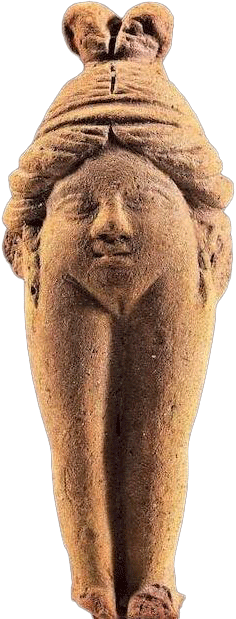When Persephone, the beloved daughter of the goddess Demeter, is abducted by Hades into the underworld, a deep darkness falls over the world. Demeter, goddess of fertility and grain, is paralyzed by grief. She wanders restlessly across the earth, searching for her daughter and refusing to let anything grow. Fields wither, trees shed their leaves, and humanity begins to starve. The world holds its breath.
All the gods try to console her—in vain. No word, no comfort reaches her. Her grief is as vast as the abyss itself.
Then Baubo appears, a servant in the house of the King of Eleusis, where Demeter has taken refuge. She is neither powerful nor divine, yet she carries within her something older than all the laws of the gods: the raw, untamed force of the primal feminine.
Baubo sees the goddess, heavy and mute in her sorrow, and understands: only a shock, only laughter that rises from the depths of the belly, can call her back to life. So she resorts to a means that is both radical—and sacred. She lifts her robe, exposes her vulva, and utters a coarse jest, so outrageous that even the shadows of the underworld would tremble.
And then the miracle happens: Demeter, who has not laughed for days, looks—and laughs. At first hesitantly, then her whole body shakes, and from her laughter life bursts forth. A crack runs through the wall of her grief, light breaks in, warmth returns.
The earth breathes again.
For in this moment, in this obscene, wild, and sacred gesture, the goddess remembers what she truly is: the source of life, the womb of the world, the primordial mother whose power lies not in the head but in the womb, in laughter, in blood, and in the earth itself.
Baubo does not simply reveal a body part—she reveals the gate of life, the primal essence, the power that no order and no death can ever fully subdue. In this gesture resides fertility, vitality, the defiance of despair. And within it lies the message: life insists on continuing—even in the face of death.

Baubo
Symbolic Meaning of Baubo’s Gesture
The Primal Feminine as the Source of Life
Baubo’s exposed vulva is not obscene in the modern sense, but an ancient symbol of the creative principle. It embodies the womb of the earth, the origin of all life. This gesture reminds Demeter—and us—that life springs from the physical, the feminine, the earthbound.
Sacred Obscenity – Laughter as Healing
The laughter Baubo provokes is not superficial amusement but an archaic, purifying force. In many myths, the sacred is invoked through humor and corporeality. Here, the feminine is shown not only as fertile but as healing: the womb and laughter break the spell of death and grief.
The Power of Shock and Reversal
Baubo uses transgression to break through a deadlock. Her gesture defies norms and overturns hierarchy: a simple servant “instructs” a goddess. This shows that primal feminine power is not tied to status or authority—it is universal, raw, untamed.
Integrating the Body into the Spiritual
This scene unites the physical and the divine. Spirituality here is neither distant nor ascetic, but deeply rooted in the body, in cycles, in sexuality. The feminine is not portrayed as sinful or inferior, but as the gateway to life and renewal.
Fertility as Defiance Against Death
While Demeter casts the winter of grief over the world, Baubo’s gesture calls forth spring. It is an act of life’s insistence, an ancient “no” to the rigidity of death. The vulva becomes a symbol of hope, creation, and cyclical return.
Feminist & Archetypal Interpretations
Marija Gimbutas – The Language of the Goddess (Significance of vulva symbols in ancient European culture.), Erica Jong – Sappho’s Leap (References to female humor and the erotically fertile archetype.), Clarissa Pinkola Estés – Women Who Run With the Wolves (Chapters on “Sacred Laughter” and the role of the feminine as life force.), Mary Daly – Gyn/Ecology (Radical feminist analysis, including vulva symbolism as a source of power.)
